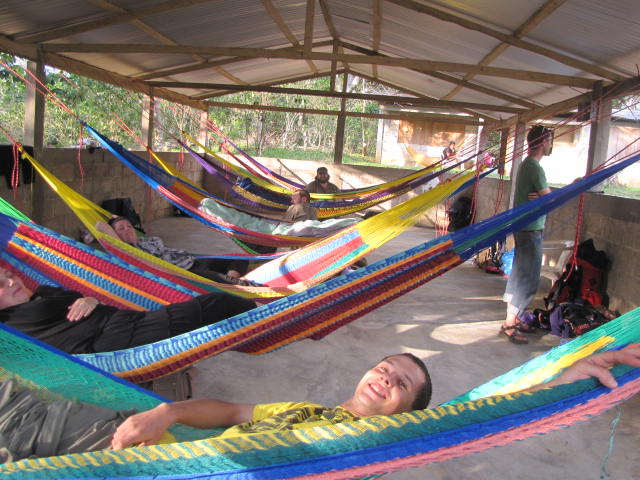Clothing
Los Altos: The weather in the highlands of Chiapas (San Cristobal area) is the most variable. Though days are often relatively warm (although occasionally windy or rainy), the nights are always brisk… and sometimes down right cold. If you are visiting the Highlands, you will definitely need clothes for cooler weather. If you are visiting in the winter, you may even want a winter type jacket.
- Clothes for cold and rain.

- Clothes for warm days.
- Swim suit.
- Shoes: 2 pair in case one gets wet,
tennis shoes are adequate, boots are fine,
rubber boots are a pain to carry but come in handy when there’s mud everywhere. - Jacket: think rain, cold and mud.
- Depending on the time of year, a hat and gloves can be nice.
The Tropics: The weather in the Northern part of the state (Palenque area) is typically hot and steamy. You will still need to plan for rain and you will want to bring lightweight long sleeve shirts and long pants for the pleasant cool evenings and to protect yourself from the bugs.
- Clothes for hot days
- Swim suit
- Clothes (long pants and long sleeves) for cooler nights and bugs
- Shoes: tennis shoes are fine,
sandals are often desirable - Jacket or poncho: think rain
Suggestions of things to pack for a one week caravan to a Zapatista caracole. We urge you to pack “light” for your personal needs and pack “heavy” for the items you will donate. Remember that your donations of cash and other items are very important in supporting the Education projects in Literacy, Health, Agro-ecologia and Productive Projects.
Personal Hygiene
- Personal water container*
- Bug spray – DEET or Neem,
- Tooth brush and paste*
- Toilet paper*
- Towel
- Sun screen
- Biodegradable soap
- Comb*
- Deodorant*
- Shaving equipment*
Sleeping equipment

Donations of bedding always welcome.
Click here to read FAQ about sleeping conditions.
Los Altos: Night time is always cold.
- Three season sleeping bag
- Sleeping Pad (optional. We usually sleep on bunk beds.)
- Lightweight tarp(optional)
- Travel pillow
The Tropics: It cools off at night.
- Hammock or sleeping pad*
- Sleeping bag (even in the tropics the nights can be cool)
- Backpacking tent (optional)
- Mosquito net (optional in the tropics)
- Travel pillow
Miscellaneous
Your purchases in Zapatista Territory will help support the autonomous structures, therefore we urge you to buy as much as possible of you needs directly from the stores in the Zapatista civilian centers.
- Personal comfort foods**
- Pocket knife
- Flashlight*
- Candle and matches*
- Batteries for lights and other machines*
- First aid kit
- Writing materials*
- Reading material*
- Camera
Donations from BriCO human rights observers to the communities are discouraged during your stay. If you are interested in making a specific donation, we encourage you to apply your donation to one of our Gifts of Change, which will be allocated as the caracoles deem most important.
*******************
*Things that can be bought in Mexico and/or in Zapatista Territory.
Please buy Zapatista! Many Indigenous vendors will be happy to sell you Zapatista knock offs and other handcrafts. Most vendors trying to sell you things outside of Zapatista Territory are NOT Zapatistas.
Remember that shopping Zapatista helps to support and build the movement!
Wonderful indigenous crafts and artwork can also be purchased in Zapatista territory. These items make great souvenirs and gifts. Bring extra cash!
** A brief note about comfort foods:
While living and learning in the caracoles, caravans prepare a balanced and organic diet based largely on locally grown produce, especially the “three sisters” (corn, beans and squash). Cooking and eating communally is one of the daily activities of every delegation. Participants always have more than sufficient food; however since this diet represents a significant departure for many participants we suggest brings a few food items from home to overcome the cultural shock of adapting to an indigenous diet.

